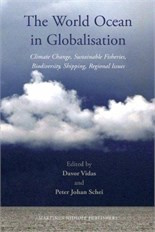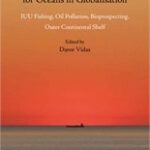Authors
Davor Vidas and Peter Johan Schei (editors)
Publication Year
2011
Source
Martinus Nijhoff Publishers /Brill Academic Publishers
xxx+550 pages
In this major book, edited by Davor Vidas and Peter Johan Schei, thirty-three experts on marine affairs and the law of the sea examine the emerging challenges for the World Ocean, inquiring into developments prompted by globalisation in central issue-areas of the law of the sea. These are explored systematically in sections on the key challenges and developments in the interface of science, economic uses and law (Part I); climate change and the oceans (Part II); sustainability of fisheries (Part III); challenges and responses related to global maritime transport (Part IV); and the regulatory responses to global challenges in seas surrounding Europe (Part V). The questions raised in this book follow from an overall concern increasingly voiced by scientists in recent years: Have we already entered a new epoch – the Anthropocene, dominated by the impact of human activities? What, in that context, are the effects of increasing globalisation on the seas and oceans?
This is the second of the two volumes resulted from an international conference ‘The World Ocean in Globalization: Challenges for Marine Regions”, hosted by the Fridtjof Nansen Institute (FNI) on 21-23 August 2008. The first volume was issued by the same publisher, Martinus Nijhoff/Brill, in the spring of 2010: Law, Technology and Science for Oceans in Globalization (Davor Vidas, ed.) and was presented in the previous edition of this Bulletin. Many of the chapters of the second volume are updated and refined versions of papers delivered at that conference, supplemented by chapters on additional key topics. As is stressed in the Preface of this volume by the Editors “Our objective goes beyond merely preparing a set of conference proceedings. The aim has been to produce two related, highly integrated volumes that present a state-of-the-art report on many legal and policy issues for seas and oceans that are emerging in the wake of increasing globalisation. The two volumes provide a broad overview of the overall theme of the oceans globalization, dealing with numerous specific issue-areas”.
| TABLE OF CONTENTS |
List of Acronyms and Abbreviations; List of Figures; List of Tables; Notes on Contributors; Preface The Editors; Acknowledgements
Introduction
1 The World Ocean in Globalisation: Challenges and Responses for the Anthropocene Epoch, Davor Vidas and Peter Johan Schei
Part I: KEY CHALLENGES AND DEVELOPMENTS: SCIENCE, ECONOMIC USES AND LAW
2 The Anthropocene Ocean in Its Deep Time Context, Jan Zalasiewicz and Mark Williams
3 Marine Science in the Past 25 Years: Main Findings and Trends, John Montgomery and Lionel Carter
4 The Sea, Science and the Human Dimension, Marie Jacobsson
5 Economic Uses of the Oceans and the Impacts on Marine Environments: Past Trends and Challenges Ahead, Harry N. Scheiber
6 Problems of High Seas Governance, David Freestone
Part II: CLIMATE CHANGE AND THE OCEANS
7 Impacts of Climate Change on Marine Ecosystems, Yvon Le Maho and Joel Durant
8 The Polar Oceans and Climate Change, Olav Orheim
9 Climate Change and Arctic Governance: Three Images of a Changing Arctic, David D. Caron
10 The Climate Regime: Achievements and Challenges, Steinar Andresen and Tora Skodvin
11 Sea-Level Rise and the Law of the Sea: Future Options, Moritaka Hayashi
Part III: SUSTAINABILITY OF FISHERIES
12 High Seas Fisheries Today: Challenges and Remedies Under the Global Economy, Nobuyuki Yagi
13 High Seas Fisheries Governance: Prospects and Challenges in the 21st Century, Kristina M. Gjerde
14 High Seas Fisheries Management: Reflections on Experience with Regional Fisheries Management Organisations in the South Pacific, Gerard van Bohemen
15 Reducing Seabird Bycatch: From Identifying Problems to Implementing Policy, Euan Dunn
Part IV: GLOBAL MARITIME TRANSPORT: CHALLENGES AND RESPONSES
16 Mare Liberum or Mare Restrictum? Challenges for the Maritime Industry, Eelco Leemans and Thomas Rammelt
17 Global Shipping and the Introduction of Alien Invasive Species, Stephan Gollasch
18 Globalisation and Challenges for the Maritime Arctic, Lawson W. Brigham
19 The International Maritime Organization and the Protection of the Marine Environment, Jean Claude Sainlos
20 Regulatory Layers in Shipping, Henrik Ringbom
21 Ballast Water and Alien Species: Regulating Global Transfers and Regional Consequences, Davor Vidas and Maja Markovcic Kostelac
Part V: SEAS SURROUNDING EUROPE: REGULATORY RESPONSES TO GLOBAL CHALLENGES
22 The European Union and the Challenges of Marine Governance: From Sectoral Response to Integrated Policy? Robin Churchill
23 Towards Further Reform of the Common Fisheries Policy, David J. Agnew
24 The European Union and the Regulation of Underwater Noise Pollution, Irini Papanicolopulu
25 The Black Sea: Moving Forward, Nilufer Oral
26 Baltic Sea Gas Pipeline: International Law for Geostrategic Issues, Hans Corell
27 The Mediterranean Response to Global Challenges: Environmental Governance and the Barcelona Convention System, Evangelos Raftopoulos
Index of Treaties and Other International Instruments; Subject Index
About the author

Davor Vidas
Research Professor and Director of the Law of the Sea Programme at the Fridtjof Nansen Institute, Norway. He is the Chair of the ILA International Committee on International Law and Sea Level Rise, and a member of the Anthropocene Working Group of the International Commission on Stratigraphy. He has led many international research projects on various aspects of international law. His recent authored or edited books include The World Ocean in Globalisation (Brill, 2011), Law, Technology and Science for Oceans in Globalisation (Brill, 2010), Croatian-Slovenian Delimitation (?kolska knjiga, 2009), and Protecting the Polar Marine Environment (Cambridge University Press, 2006/2000).

Peter Johan Schei
Director of the Fridtjof Nansen Institute, Norway. He was International Negotiation Director of the Norwegian Ministry of Environment (1995-2004). He has held a number of international appointments, especially related to CBD, and was responsible for biodiversity at the 2002 Johannesburg Summit. He is Chairman of the Birdlife International.




